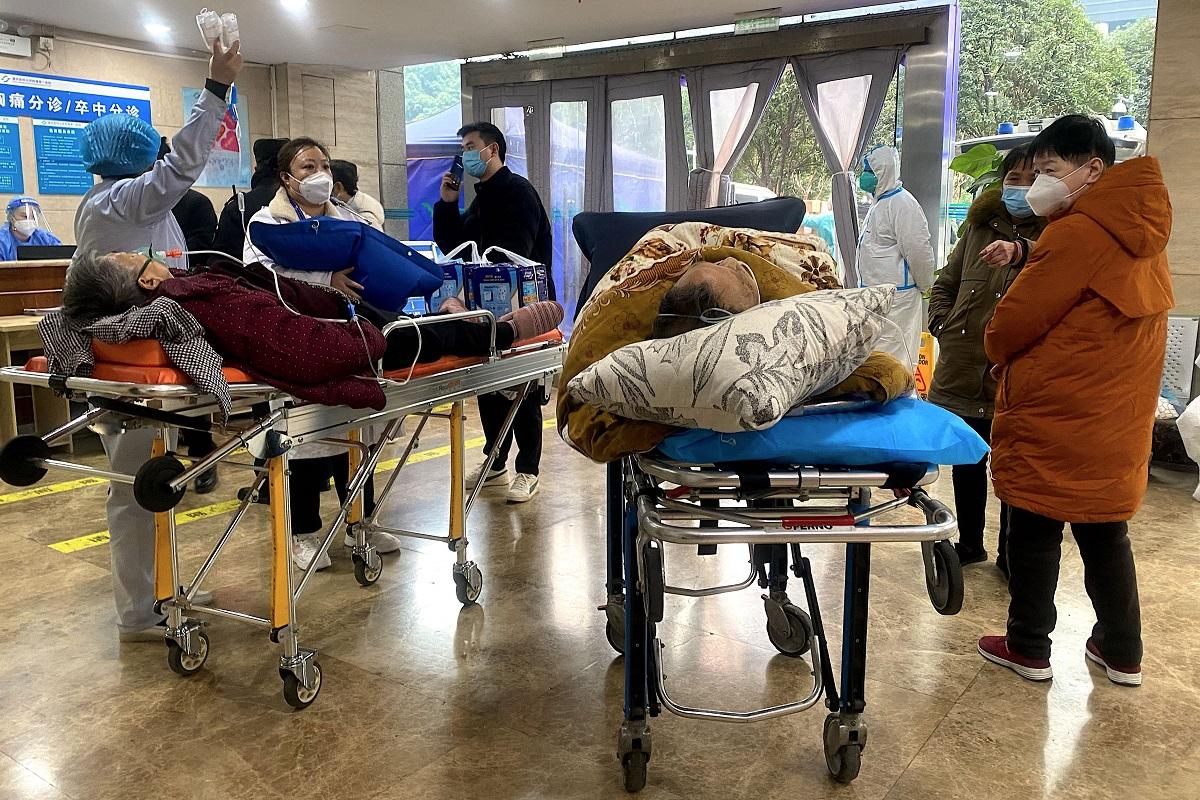Elderly COVID-19 patients fill hospital wards in China’s major cities

CHONGQING, China — Elderly patients lined the wards of hospitals in major cities in China Thursday as the country battled a wave of COVID-19 cases.
The virus is surging across China in an outbreak authorities say is impossible to track after the end of mandatory mass testing.
Attached to a breathing tube under a pile of blankets, an old man racked with COVID-19 lay groaning on a stretcher in the emergency department of a hospital in central China Thursday.
A paramedic at Chongqing Medical University First Affiliated Hospital, who confirmed the old man was a COVID-19 patient, said he had picked up more than 10 people a day, 80 to 90 percent of whom were infected with coronavirus.
"Most of them are elderly people," he said.
"A lot of hospital staff are positive as well, but we have no choice but to carry on working."
The old man waited half an hour to be treated, while in a nearby room AFP saw six other people in sick beds surrounded by harried doctors and relatives.
They, too, were mostly elderly and, when asked if they were all COVID-19 patients, a doctor said: "Basically."
Five were strapped to respirators and had obvious breathing difficulties.
Millions of elderly people across China are still not fully vaccinated, raising concerns that the virus may kill the most vulnerable citizens in huge numbers.
But under new government guidelines, many of those deaths would not be blamed on COVID-19.
Staff at the Chongqing hospital had their hands full, ferrying elderly patients to different floors as families and other visitors hovered anxiously.
A passing inpatient ward doctor confirmed the hospital had been very busy with COVID-19 patients but declined to elaborate.
In Shanghai, the corridors of an emergency department were lined with stretchers filled with elderly people hooked up to oxygen tanks.
An AFP reporter counted at least 15 such patients spilling out from the wards into the hallway, some with suitcases next to their trolleys.
Swaddled in colorful duvets, they wheezed weakly through their masks as medical workers attended to them, many appearing mostly unresponsive.
Some of their visitors set up camp chairs next to the makeshift beds.
Staff and visitors did not respond to questions from AFP.
'Constantly busy'
At a large crematorium on the rural outskirts of Chongqing, a long line of cars waited for parking spaces inside the compound Thursday afternoon.
Dozens of bereaved relatives milled around in groups, some carrying wooden urns, as funeral gongs sounded and mourners burned incense.
Grieving relatives in a waiting room adjoining a large furnace watched as their loved ones' remains were incinerated and carefully swept into a metal box by workers.
One middle-aged man carrying an urn told AFP an elderly relative died after testing positive for the virus.
"It's been constantly busy lately," said one crematorium driver as he sat smoking in his car.
"We work more than 10 hours a day with few breaks."
He said he did not keep count of how many bodies he transported per day, nor did he know if they were COVID-19 patients.
AFP saw about two dozen mourners waiting in the sleek service hall of another vast crematorium in urban Chongqing.
"Recently the daily number of cremations has been very high," said one staffer wearing an overcoat and face shield.
"It's not possible to put bodies in cold storage, they must be cremated on the same day." — AFP




